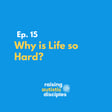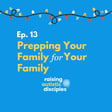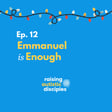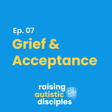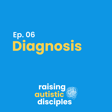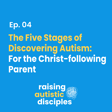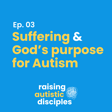Become a Creator today!Start creating today - Share your story with the world!
Start for free
00:00:00
00:00:01

New Normal
Join Collin as he has a conversation with Pastor Wayne about the New Normal after a child's autism diagnosis.
Transcript
Advocating for Autistic Children and the Gospel
00:00:05
Speaker
Yeah, I've learned through autism that I am my child's greatest advocate and I have to step up for that and I'd also like to share that he needs the gospel. He needs to know Jesus. His biggest problem is not that he doesn't understand things the way we do. His biggest problem isn't that he struggles with transition. His biggest problem is that he has sin and he needs to be redempted by the blood of Jesus Christ.
00:00:27
Speaker
If he's not saved, if he doesn't come to know Jesus Christ, it doesn't matter about the rest of the stuff because he will eternally be lost. And I don't ever want to do that for myself.
Introduction to 'New Normal' Episode
00:00:40
Speaker
Hi friends and welcome to the Raising Autistic Disciples podcast. This is episode eight in which we're titling new normal. And today you're going to hear a conversation between Colin and our friend Wayne. And what is special about this episode, not only just discussing the new normal life after a child's diagnosis for our families, but what I want to bring out just at the beginning, almost like a spoiler, but for you to think about as you listen to the conversation.
Sharing the Gospel with Autistic Children
00:01:08
Speaker
And that is around the word exempt. Meaning, friends, as believers in Jesus, as followers of Jesus, we are not exempt from gospel proclamation.
00:01:20
Speaker
are not exempt from sharing the gospel, the good news, with our autistic children. We may not know if they understand. They may not interact with us when we tell them about Jesus, but we're not exempt from it just because they're autistic. The other side of that is you're going to hear from Wayne, who is a pastor.
Challenges as a Pastor and Parent
00:01:40
Speaker
And so you need to know, too, pastors aren't exempt from hardship or raising autistic disciples, right? And so you're going to hear his heart behind that and how that's a challenge as well. And it's just an encouraging conversation. And so I hope that as you listen, the Lord will stir your heart for more of him. And this is episode eight titled New Normal. Join the conversation, friends, as we listen to Colin and Wayne chat today.
00:02:12
Speaker
All right, Pastor Wayne, thank you for being on the podcast. How are you doing today?
Impact of School Bus Driver Strike
00:02:15
Speaker
I am doing excellent, sir. I hear you have an interesting situation with the school transportation you've been dealing with today.
00:02:24
Speaker
Yeah, the school bus drivers have decided to go on strike. And that happened last night at about seven o'clock. And so 12 hours notice at seven o'clock this morning, all 17,000 students in our community have to be taken to school by their parents, including my son who is, of course, autistic. And so change is a four-letter word in my house.
00:02:47
Speaker
And so that meant that we had to do some changes this morning and that didn't always go as smoothly as we'd hoped. So, uh, hopefully it'll be better on Tuesday. Uh, hopefully they'll settle the strikes. Absolutely. So, uh, that's where we're at. Well, then I'm sure for every, every parent or anybody that's listening to this podcast, as soon as you said, uh, the word change and the, uh, everybody just does a collective gasp. We all feel your pain immediately.
00:03:16
Speaker
Exactly. Because believe it or not, 12 hours is not long enough to equip your autistic child with that kind of change. New, different harness and different direction that we're going in a different time that we're going. Yeah.
00:03:34
Speaker
Yeah, yeah. So now that you mentioned that, tell me a little bit about your family.
Navigating Autism Diagnosis
00:03:39
Speaker
Sure. So, Sarah and I have been married for 22 years and we have two children. Elizabeth, who is my 14-year-old teenager, who just got asked a homecoming, so you need to pray for me on that as a dad.
00:03:54
Speaker
Uh, well, it starts happening, but, uh, and then I have my nine-year-old son, Anakin. And if you're wondering, yes, I named my son after Darth Vader and, uh, he is autistic. And, uh, we were diagnosed with autism about a year and a half after he was born. About 18 months, I started to notice that he started regressing in his language. Uh, he had started saying mom and dad, and then he just stopped saying mom and dad.
00:04:22
Speaker
But his sister talked a lot, so he said, you know, hey, it's just his sister talks a lot. So at two, the doctor said we should do something about it. We said, no, let's wait six more months. And after six more months, it was very clear that he was not developing what he should. And so we were diagnosed just prior to three, because in the state of Illinois, where we lived at the time,
00:04:46
Speaker
If you were diagnosed prior to three, it was covered by the government. They paid for your autism tests and all that stuff. And after three, you were responsible for that. And so he was diagnosed just prior to turning three with autism. And we have been doing that now for the last six years of dealing with autism. I often get the question, is he high function? Is he low functioning? No one ever told us.
00:05:09
Speaker
If he was high functioning or low functioning, they just said he was autistic. And so we've never had that official, you know, label of high or low. I don't think he's high. I don't think he's low. I think he's somewhere in between those two things. He definitely is verbal. He's not nonverbal.
00:05:26
Speaker
But I like to say he's limited verbal because he still struggles to communicate and he really struggles with transitions.
Balancing Pastoral and Family Duties
00:05:35
Speaker
Transitions are anything that is different than what he wants to do. So, hey, you're watching TV. Now it's time to go eat dinner. That's a transition. Hey, it's time to put that toy away because we have to get a bath. That's a transition. So those are the things that we still struggle with.
00:05:50
Speaker
and some of the things that we're still dealing with on that level. And then on our church level, I mean, as we talk about discipling, you know, that's something I always, you know, try to make sure we pour as much Jesus into him as he can. But, you know, as we shared before we started recording, sometimes it's tough in a church atmosphere to get him into our church because
00:06:10
Speaker
You know, he can't necessarily sit in the worship center the whole time and he doesn't always want to go to children's church He doesn't always want to play the game that all the other kids are playing and so that's kind of where we're at I'm the pastor of the church and I should probably put that out there. I'm the pastor of the church and so That makes it a little more tougher because obviously on Sunday mornings I have a ton of responsibilities That doesn't always allow me to be able to take that so that means on Sundays my wife shoulders a lot of that responsibility
00:06:38
Speaker
on the plus side of that because I'm a pastor, I have a flexible schedule. And so I'm able to shoulder more of the responsibilities during the week so that she can work as a teacher because of where our insurance is. And so that allows me to be able to stay home with him when that time occurs or be able to take him to school and pick him up. For instance, today I'm taking him to his doctor's appointment because I am having that flexibility. So that's kind of my family, kind of where we are and what we're doing.
00:07:08
Speaker
Man, what a wonderful family the Lord has given you. And even one of the roles that we're gonna talk about today is just being the advocate for your child. So as a pastor and as a dad of an autistic child, can you explain kind of your take and your feelings on what it is like to be an advocate for your son?
00:07:26
Speaker
Yeah, I've learned through autism that I am my child's greatest advocate. And I have to step up for that. And as I like to share, he needs the gospel. He needs to know Jesus. His biggest problem is not that he doesn't understand things the way we do. His biggest problem isn't that he struggles with transition. His biggest problem is that he has sin and he needs to be redempted by the blood of Jesus Christ. Amen.
00:07:48
Speaker
if he's not saved, if he doesn't come to know Jesus Christ, it doesn't matter about the rest of the stuff because he will eternally be lost. And I don't ever want to see that for my son. And so I was just reading today in Ezekiel where God says, I don't want to see any of the wicked perish. I want all of them to turn and repent of their sin. And that includes people on the autism spectrum. He wants all of them to know Jesus. And
00:08:13
Speaker
And I believe Andy can know Jesus. I believe he can have a relationship with him. There's nothing mentally wrong. He's a very smart kid. So I know that he can understand those things. And that means he can understand sin and understand his need for Christ. And so I wanted to understand that because I wanted to have a relationship with him.
00:08:30
Speaker
That's right. Yeah. Yeah, absolutely. And it's an important for most people to know and for church members to know that rhythm and understanding when families get diagnoses for autism in their families, that their entire new normal is upset. It's changed. Everything you thought was going to be true about your child is not different and you have to adjust, right?
00:08:55
Speaker
And so the purpose of this today's episode is to discuss that, is to discuss the
00:09:01
Speaker
how the diagnosis that you get in a family, how that upsets that normal, and then how you adjusted and establish new rhythms. And so begin by telling us a little bit about that in that diagnosis period, how did you navigate and how did you and Sarah navigate hearing that diagnosis?
Acceptance of Autism Diagnosis
00:09:19
Speaker
I think my wife would be the first one to say that I probably handled a little better than she did. She was in denial for a long time.
00:09:28
Speaker
They don't know what they were doing. The test is rigged and all this other stuff. And I'm like, there's something different here. And I think that's just mama being mama bear and wanting to protect her kid and not wanting to deal with that. I don't think it was anything nefarious. It was just, no, this isn't true. And I kind of came to that a little bit quicker than she did. But even in that process,
00:09:53
Speaker
I've shared this many times that we didn't tell our family for six months. We didn't tell our family for six months that he was diagnosed autistic because we didn't know how they would react. We didn't tell our church for a year. I was at a different church then. I was the pastor there as well.
00:10:10
Speaker
I was like, how's this church going to take this? When we talk about this new normal, that's one thing that I had to negotiate through, not negotiate's a bad word, but one thing that I had to figure out through a search process of looking for a new position, knowing that God had called us to move on, but also understanding that I'm not a typical pastor. You're not going to be able to just have me and my wife and our two kids there all the time smiling with no problems.
00:10:37
Speaker
You know, I had to approach churches flat out very early in the process and say, well, hey, you know, my son is autistic. You know, usually within the first question, I would bring that up into the answer. You know, my son is autistic and I'm not going to be your typical pastor. And if you're looking for a pastor and his wife to sit there through every dinner and.
00:10:54
Speaker
And your kids are going to be well, super well behaved. You're probably going to get one of us, but not the other because one of us is always going to have to be attentive to our son. And that was the ending of a lot of interviews. That was a lot of interviews with churches because they weren't ready to handle that. And that was part of our new normal, understanding that we have to be upfront, that this is in ministry, you know, you're in that bubble and everybody watches you and you have to be upfront that this is part of
00:11:18
Speaker
our life and part of who we are and that's part of who Anakin is and so that was definitely a huge change for us is how to navigate the whole world as a pastor with a son who's on the autism spectrum and you know even communicating things to our church like hey you know we're going to have these therapists that are women they're going to come into my house when my husband's there by himself and you have to understand that this is nothing bad going on
00:11:41
Speaker
These are therapists that are coming in to work with his speech and to work with his occupational therapy. And they come to our house. And so don't freak out when you see some strange woman coming in and out of the pastor's house because they're there working with our son. And that sounds so funny. I see you laugh at that, but it's also very true. I mean, I've had pastors who are accused of, hey, there's a woman there. There's having an affair. We'd be very clear. This is not what's going on. This is part of our autism therapy. That was part of our new normal, is over explaining.
00:12:10
Speaker
everything that was going to be happening with our son and still trying to explain some of that to our church people. And so, man, I'm even struggling too. I've said before, I don't know what normal is anyways for Christians. As Christians, we're already abnormal. We're already the minority here. And so, even going further is that we're, you know, Christians that have a son on the spectrum. It was just a different, things for us are very different from than they are for a lot of people. We don't get to go
00:12:39
Speaker
We go to the same five restaurants. We go out to eat. It's the same five restaurants in the same five locations because my son will go to and they know us. I love Skyline Chile. I'm a Cincinnati man and I love Skyline Chile. We go to the same Skyline Chile every Wednesday because they know us and they know when he goes through his patterns.
00:13:00
Speaker
they've got stuff set up for him at the table to get him there. I mean, that's part of our new normal, is being comfortable with those things. And so that's, you know, part of our new routine is that we've understand that routine is our friend. That's right. And so we try to keep everything as routine and as normal as possible.
00:13:19
Speaker
And so, yeah, so on top of that, when do you think the turning point was for you and Sarah both together when it came to being on the same page of that new normal and accepting it?
Adjusting to New Family Dynamics
00:13:30
Speaker
Do you remember a time where it was clear and palpable that, hey, this is new and we're going to lean into it? I don't know that there was one moment that I can look to. I think it was just a process of just gradually getting there and understanding things were different.
00:13:47
Speaker
I think when we got the diagnosis, that was one of those key moments. And I think being able to tell our parents was another one. And I think being able to come before the church and say that, I think, was really what codified it. You know, when, hey, this is real. You know, when you admit to the church, this is real, this is who we are, this is where we're at. I think that was kind of a moment where it was just
00:14:11
Speaker
I hate to use the word acceptance, but just kind of the understanding that this is, you know, this is our, this is what's normal for us. This is what's happening in our lives. And I think those were all watershed moments. You know, getting registered for kindergarten was another one when you realize, okay, he's getting different. They do a great thing here in Ohio. In Ohio, they have the autism scholarship.
00:14:34
Speaker
And so I didn't have that in Illinois when I was pastoring there, but Ohio, they have the autism scholarship, which basically, if your child is diagnosed and has an IEP for autism, you can, if the local school is not providing the right kind of classes for him, you can get $30,000 from the state of Ohio to take him to any private school that you want.
00:14:58
Speaker
And it incentivizes the public schools to have good services and incentivizes the private schools to be there. And so when we registered for kindergarten, it was like, well, he's going to be going to a social communications classroom. Well, what's that? Well, that was an autism classroom that they had designed. And that was another watershed moment to realize he's not going to be in a normal classroom. He's going to be in a social communications classroom. So I think all of those were watershed moments that helped us kind of understand where we're at and dealing with
00:15:25
Speaker
Yeah, so I want to ask a philosophical question first on this.
Rhythm over Balance in Family Life
00:15:30
Speaker
I didn't prep you on this because I want to get your just baseline reaction to it. But there's our family has been using the word rhythm for a very long time, even before our program was diagnosed with autism as to kind of
00:15:45
Speaker
codify what our life is going to be centered around. It's a rhythm, right? So about two weeks ago, I read a quote in a book that I want to get your reaction to and see what you think. It says, balance is an elusive dream, but rhythm is a beautiful dance. Rhythm is a choice I make. It allows for busy seasons and the unexpected. A God-ordained rhythm will allow us to live and lead from a healthy soul.
00:16:10
Speaker
And so it's the end of a illustration that he uses in the book describing the difference between a guy that's balancing plates. And so we've probably all seen those people that they spend plates on the end of sticks and they try to keep as many plates in the air as possible. That the difference between a mindset that is working on balance as opposed to a rhythm is
00:16:34
Speaker
is leads to an opportunity for us to have a healthy soul in the midst of unexpected and busyness. And so can you speak to that for a second? Like if just in that and that idea of balance and rhythm, have you seen that play out in your life recently? So much of autism feels like I am just throwing plates in the air. Yeah, everything going in the direction it needs to go.
00:17:00
Speaker
I would put it this way. You know, one of the things that I've learned is so important with Anakin and with us is time and time and patience, right? And so, for instance, the bus, when it's supposed to get here, arrives at 7 45. I set our alarm that we have at 7 25. And if Anakin does great and gets ready, we stand outside for 15 or 20 minutes waiting for the bus.
00:17:29
Speaker
Yeah, yeah. But if it doesn't, then we got 20 minutes before we have to start spinning the plates in the air, right? Because the opportunity to wait him out and to be patient with him helps us not to get to the panic moments.
00:17:50
Speaker
And I wish I could tell you that I was the perfect father and I've got autism all figured out. And sometimes you listen to these podcasts and think, well, these guys must have it all figured out. Man, I make mistakes so many times. It's not even funny. And autism, I always say autism is unforgiving. And by that, I mean, if you make a mistake, my son will point it out to you.
00:18:11
Speaker
If you put the pants on wrong, he's going to go nuts. It's part of the process. It is unforgiving. And what I've learned is the rhythms go well when you have time for the rhythm. And so when you have it all organized, we're going to do this. We're going to do this.
00:18:26
Speaker
And we're going to plan this in advance because if we wait until five minutes before we have to do something and we interject something that's not normally there, that's when the plate starts spinning. That's when we get mad. That's when people, that's when we start yelling and that's when he starts crying. And that's what we want to avoid. We need the time built in. And that's part of having that rhythm and understanding. We do the same thing every day, every time, at the same time, every morning, 7.25. That alarm goes off and we start getting ready for school.
00:18:55
Speaker
Um, and, and it's the same thing at church. You move to a time for church. At this time, the alarm goes off. We start getting ready for church. We do the same thing the exact same way, the exact same time. And when we don't is when things start to get out of, out of rhythm. And when we get out of rhythm, then like this morning, when we didn't have bus service and I had to try to basically force him out of my car because I've read them. That was not part of what we were doing. Right. Absolutely.
00:19:20
Speaker
Yeah. And that's, um, and so we're kind of hearing from your heart currently is like some of the outflow of, of the last, you know, I guess it would be six years, a little over six years of diagnosis. But if you can go back to that, after that, to the diagnosis and the months and years following, what are some specific things that your family put into place that, um, that kind of started to establish a rhythm in your family? How did that, how did that process work?
Establishing Family Routines
00:19:48
Speaker
Um, well, you know, I think it was, it was a process, I think is the best term to put. I mean, there was one moment where it was like, Oh yeah, we're going to do this and everything just radically changed. It was a learning process of this works here and this works here and this works there. And maybe we should try this differently this time. Um, and, you know, I think some of the things that, that we just put in places, you know,
00:20:13
Speaker
part of that was getting people to understand that things weren't going to be quote unquote normal with us. Yeah. Yeah. Explaining to our employers that there are times when we just have to leave work because there's an issue and we have to go take care of it. My friend and I have to stay home, things like that. But I think also to understanding that when we
00:20:33
Speaker
set alarms when we have things in advance that we can communicate as often and as early and as regularly as possible that that's when things start to go well and that's when we start learning that we have to go to the same places we have to do the same things we have to
00:20:49
Speaker
understand that they're in part of that. And I think this isn't discussed enough. There are things that we can't do that other people do. We talked, you know, the convention, the Southern Baptist Convention, you know, I've been in Southern Baptist my whole life. I'm not going to diss our Southern Baptist Convention. But I will say that, you know, for instance, they have childcare at the Southern Baptist Convention, so you can bring your family and go, but they don't have accommodations for kids on the autism spectrum to handle that.
00:21:14
Speaker
And so my family doesn't get to go to the Southern Baptist Convention because we don't have childcare that can handle him. There was a Gideon thing where they had to get, hey, we want you to come with your wife. That's great. We have childcare. Can you handle autism? Do you have one-on-one? Oh, no, we can't do that. Well, I'm sorry. We can't go to your Gideon thing because we don't have, you know, the childcare that can handle that. And that's not a knock on the Gideon's either. That's part of the proactive thing and saying, you know, this is something that needs to be aware of. I remember reading an article
00:21:44
Speaker
a blog post, I can't remember, where it talked about the churches want the perfect pastor, right? Everybody, every church that's looking for a pastor is looking for a pastor that's aged 30 to 40 with, you know, three kids and, you know, all this other stuff. Those people don't exist and those that do are being well paid and already taken care of. Yeah. And so churches have to understand as well that there are a lot of people out there who are on the autism spectrum that is not a perfect life. It's not perfect.
00:22:13
Speaker
and how that goes. And I don't know how I got off to that or. No, no, yeah, yeah, no, no, absolutely. But I think that's something that we need to be aware of, too, that it is going to be different. It is not going to be the same. And it's not. That's right. It's never going to be the same. I mean, I'm never going to have a normal life. Whatever I thought I was going to do before is not going to be what I'm going to do now. And I can't always do the things that everyone else is doing. And I it took a long time to accept that. I think that was the hardest thing for me to accept.
00:22:40
Speaker
was and to be honest, I'll be very vulnerable. There's certain things that I can't think about. Because I can't go to there, you know, one of the things is, you know, and I struggle, I try not to get emotional. I say this, I never am going to get to play catch with my son.
00:22:55
Speaker
And that hurts me so much because that's all I've ever wanted to do. And that was something that I can't think about. I can't dwell on that or I become very bitter and very angry. And that's not helping me and that's not helping him and certainly not glorifying the Lord Jesus Christ. Absolutely. Part of it too is learning, learning that there are some things that are never going to be able to happen and that's okay. That's right. But I can also dwell on that. And so that's part of it as well.
00:23:19
Speaker
Yeah, that's right. And that, and you hit on it. I know this is something for me specifically that I didn't understand the, um, as a Christian, the, the true nature of a lament Psalm. So when we studied the Psalms, when we hear David lamenting in the way that he does, I didn't truly understand what the purpose of that was until I had Graham.
00:23:40
Speaker
And like you just mentioned, something very specific and that's exactly where my heart was for a while is just learning that our father is perfect in his comfort.
00:23:52
Speaker
And he wants, like whenever suffering and things come into our life that requires a lament, he wants to hear it. He doesn't want us to self-medicate. He wants to be and demonstrate his perfect fathership. And so I know that even as this diagnosis landed on us, and I'm sure as it landed on you,
00:24:12
Speaker
the idea that we are truly dependent on him for all things, even for comfort and even for a healthy soul. It's not something we can just generate out of thin air. He wants dependent, humble people that will glorify him the most. And so you hit on something that I think
00:24:29
Speaker
This is a topic very near and dear to me specifically because our children, your children and my older two children are the same year and distance apart.
Impact on Siblings and Family Dynamics
00:24:38
Speaker
Yours are just two years older. So I have an 11 year old daughter, almost she'll be 12 next year, but they're pretty close in age.
00:24:47
Speaker
Explain, tell us how, oh, remind me daughter's name. Elizabeth. Elizabeth, all right, I'm gonna ask the question again. Sure. So this is a topic that's near and dear to my heart is our daughter, Addie, and how she relates to, relates to Graham is one of the true blessings in our life. But those conversations were difficult upfront after the diagnosis, because the new normal didn't just affect the parents, it obviously affects siblings.
00:25:13
Speaker
And so can you explain to me how, uh, how you've seen Elizabeth, uh, uh, embrace Anakin and how that new normal landed on her and in good or bad ways. I'll just share a very recent thing that happened. I want to say that my daughter's awesome.
00:25:30
Speaker
Um, Elizabeth is awesome. She's 14 going on 21. There you go. And so, you know, there's always that she's a teenager, but you know, she's awesome. She is, she, she bears more, uh, grief than she needs to. And I don't know how to, how to codify that other than she's just, she feels the weight of it. And I, I know she's had to grow up a little faster than probably other kids do. And so we were recently at an amusement park and, um,
00:26:00
Speaker
She was riding, going to ride a ride with him and the blue train was coming up and it was out of service. And so it went without putting him on. And so boom meltdown. That's right. Yeah. He doesn't understand the red. I had to run into the line and pick him up and get him into the red train. Cause I knew if he didn't ride it, he'd be even more angry. So we got it going on there and I had to look at her and I said, sweetie, she was all upset. She's like, well, daddy, daddy, I'm sorry. I didn't get to do this right. And I said, you know, you're fine. You did great.
00:26:29
Speaker
He said, well, I just lose my temper with him. And I said, I understand that, but you're going to have to calm down. And she said, why? I said, because if something happens to me and your mom, you're going to be the one that's going to be responsible for him. And the first time I'd ever had that conversation with her.
00:26:44
Speaker
that this is a reality that something happens to us. You're the one who's going to have to be able to handle Anakin as he's growing up. And she didn't say anything. I don't know how that's going to impact her, but she's a trooper. She's had to grow up a lot faster. She loves her brother.
00:27:03
Speaker
And she would do anything for him. But at the same time, she's also had to adjust her life. I mean, this is something that happened not long ago. We were on vacation and we had a very tumultuous trip and this last vacation for a lot of reason. And some of them autism related, like when my son decided he did not like Universal Studios and we ate those tickets.
00:27:27
Speaker
Yeah. And so we were talking about maybe we should try going because we always go to this. We always go to the Orlando area for vacation because Anakin really likes Disney World. And so we said, well, maybe we'll look at some other places. And my daughter begins to say, well, I said, where would you like to go, Elizabeth? You know, where would you like to go? She says, well, Daddy, I would love to go to Paris and see the Eiffel Tower. And I would love to go to this place and see that. And I'd like to go here. And I was like, sweetie, I'm sorry. Oh, I want to go to New York City and I want to see a Broadway play. And I'm like,
00:27:57
Speaker
Sweetie, those things aren't going to happen. She said, why? And I said, because I'm not taking your autistic brother to a foreign country and I have to, you know, I get enough glares and comments from Americans in English. I don't want to have to try to make that happen in France.
00:28:12
Speaker
And then try to go through an international flight and trying to deal with that with with autism or said going to a big city like New York. I said, he's not going to sit through a Broadway play. And it was an opening. I think it was she was disappointed, but it was also kind of eye opening to her that, you know, there are some things that she's probably never going to get to experience that a lot of her friends get to experience.
00:28:33
Speaker
Um, and just, you know, just a simple thing, like, you know, her being able to go to a party takes a lot of effort on our parts. Cause we got to make sure someone's here with Anakin that we can get her, that she can get picked up. And so she's done really awesome in adjusting to that and embracing him, but also understanding that things aren't ever going to be normal for her either. That's right. Yeah. Yeah. And, and the, I know Addie specifically under the amount of discipleship moments we've been able to have with her that, that.
00:29:03
Speaker
for some reason either the Lord has prevented her from saying it or she just doesn't feel it or she's caught the vision or whatever it is, but that she doesn't feel entitled to any of that stuff. Like how the Lord has decided and discipled through us and our family, like we're a team. And what the Lord has given us is what is best for His glory and for our good. And so her understanding that that is whatever the normal is,
00:29:33
Speaker
We're going to lean into it. We're a family, we're a team, and the Lord has seen it fit for that to happen. And I know we get encouraged more through her and those kinds of situations because it's clear that the Lord is working in her as well, and she sees it. And she loves her brother, and she advocates for him. And she'll go from zero to ready to fight probably quicker than we are. Oh, so is it, Will. I can tell you that.
00:30:00
Speaker
She understands what it means to advocate, and she understands that she's on this journey with us. So what the Lord gives us in grace, not only with each other as far as spouses go, but the children that he puts in these situations too, it's amazing what he brings to bear in their lives as well.
00:30:17
Speaker
It means a lot for Addie's salvation in her Christianity as well, because her faith is deepened significantly just by being his brother, I mean, his sister. And so that's been a source of deep encouragement for us too.
00:30:31
Speaker
Well, I'm sure it's the same in your family. But the one thing I have found is that it has really brought us closer together. We're very close knit. The four of us are very close knit. Yeah, we spend all our time together. Yes, you know, there's no separation there. And so we're always together. We're always doing things together. And it's really
00:30:51
Speaker
you know, brought our family closer together through this process because every time we do something, it's a family discussion. Well, how is this going to play for Anakin? How are we going to adjust for Anakin or how is this going to happen with Anakin? And, you know, even to the point that she's, like you said, like your daughter has become more of an advocate for Anakin. Well, you know, we can't do this because Anakin here, we need to do this differently because my brother's here and he's autistic. And so, yeah, I totally get it.
00:31:21
Speaker
That's right. Absolutely. And so we just spend some time talking just kind of how our family rhythms have kind of worked out, but spend some time talking. How have you, have you seen yourself or your daughter or your wife? Um, how is your spiritual growth and discipleship personally grown since the diagnosis and either as a part of your rhythms or, or not?
Spiritual Growth and Autism Challenges
00:31:44
Speaker
Well, I think you have to be more intentional with it, to be honest. For instance, you know,
00:31:53
Speaker
having a daily quiet time becomes a little more challenging because Anakin doesn't get up at the same time every day, doesn't go to bed at the same time every day. So you have to be very intentional about, hey, I'm gonna spend some time here in the word, I'm gonna spend some time praying. And that may look different than getting alone to a quiet place in your house at over a cup of coffee at six in the morning. For me, it's oftentimes with cartoons blaring on TV and an iPad in his hand, well, I have to try to just
00:32:23
Speaker
to block that out and have that time because it's a different mindset. So I had to be very intentional about my personal discipleship, about my personal growth. And when it comes to our kids, Elizabeth, we just, we tried to disciple her like we would any 14 year old. But with Anika, it's a little different because obviously we've talked, he doesn't sit through worship. He doesn't always sit through children's church. Sunday school is a challenge sometimes.
00:32:51
Speaker
small groups are a challenge sometimes because he's not going to sit there for 30 minutes and listen to somebody. He's got about 10 minutes and he's got to change subjects or he's going to have an iPad in his hand. And so one thing we've tried to keep doing is just push as much Jesus into him as possible. A great example this morning. So I had to drive to school this morning. And so when we had to drive to school in the mornings and stuff like that, I find a podcast that plays Bible kids stories.
00:33:17
Speaker
rather than listening to the music or rather than listening to some talk thing on the radio, we put a podcast on and it's a Bible story and it's a kids Bible story, you know, intended for kids so that he gets that on the way to school because I want to saturate as much Jesus into his brain and his heart as I possibly can in every moment of every day. You know, we've
00:33:38
Speaker
we've had to teach him to pause and pray before dinner because he wants to just dig right in. And so we've had to take that extra time there to make sure he understands the importance of speaking to the Lord and taking time to pray. And so we just try for every little moment we can to pour as much Jesus into him as we possibly can because we want that to saturate him as much as possible.
00:34:01
Speaker
Yeah. And, and doing Deuteronomy six right after the Shema talks about the importance of not just raising your, your children in the fear and ammunition, but how
00:34:12
Speaker
the, our discipleship journeys, we got to saturate each other in that, like put it on the frontlets of your eyes, the doorpost of your house, um, making sure it's visible and, and saturated. Like we live a life that should be centered on his word and the, the grace of that involves. And so, uh, we've mentioned several times, none of us are experts on autism. None of us haven't figured it out, but can you explain how that saturation, if you were to, if you were to give more of a scientific understanding or a,
00:34:42
Speaker
a kind of a look into his brain. How do you, why do you think that rhythm and that saturation is so important for his discipleship? That's how he learns. I mean, it's, I always use this analogy, you know, why do we sing songs? A lot of times when he sings songs in church, it's to learn scripture, right? Some of my favorite songs that we sing in church are songs that are just singing the scripture. We have a whole book of the Bible that was basically songs written to the Hebrew people.
00:35:09
Speaker
so that they would have some good theology so they would remember as we sing. Why do we know the ABCs? I would challenge you. If you're listening to this right now, do the ABCs without singing the ABC song, right? Because that's how we learn. And he learns through his rhythms and he learns through his repetition. The more we do something,
00:35:27
Speaker
the more times that we do it, the more times we do it the same way. That's how he begins to learn and retain his knowledge. And by the way, that's not really all that different than how we learn. It's just much more pronounced with, with, and he needs to do things over and over and over and over again. He can quote movies. I mean, he quotes Charlie Brown Thanksgiving, or I'm sorry, Charlie Brown,
00:35:49
Speaker
uh halloween he quotes that movie he quotes an entire line a thing with sally a you owe me restitution he will quote that why because he's watched that thing about a bazillion times and that's how we learn and so for him getting as much jesus i i want him to have that rhythm over and over and over and over again because that's how he's going to learn how important jesus is to him
00:36:15
Speaker
and how important it is for him to have a relationship with Jesus. And so that's part of the process of how he learns.
Reframing Discipleship with Autism
00:36:23
Speaker
Yeah, because you said something very profound there is that it's
00:36:27
Speaker
With autism diagnosis, you start to reframe what your understanding is of discipleship. But then when you really boil it down, what you're really doing is returning to what the word declares that you're saturating in it. With our neurotypical kids, we try to create something new. We try to create something fun. We try to make sure it's not stale. We try to do the work for the word instead of letting the word do the work. But I think what Graham has taught us specifically is that the word doesn't have to be
00:36:57
Speaker
tied up in this bow that, uh, that makes it more appealing that the, the true saturation of the word and as the whole experience works in his heart, he's going to eventually over time, uh, take that saturation and it's going to make, it's going to mean that he'll understand sin. He'll understand his need for a savior.
00:37:16
Speaker
And that the Holy Spirit completely does that work. Our job is to raise Him in the fear and admonition of the word. And that's our job. That's what we're meant to do. And so that's a good word, brother.
00:37:27
Speaker
I was gonna say, and sometimes I think we've complicated it too much. The gospel's simple. Oh, it is. Absolutely. Yeah, it's very simple. And it's so simple that Jesus said, let the children come to me. It's so simple that even the children can understand what it means to have a relationship with Jesus. We don't need to put in a package and wrap it in a bow. Jesus did that for us. That's right. Absolutely. There's beauty in the simplicity of the gospel. Oh man, man, preach it. That's excellent.
00:37:52
Speaker
And so this is the last question I have for you today, but I want to give you some time because I think what you have to say on it is highly encouraging to families that are navigating this.
Embracing the Journey and Spiritual Health
00:38:04
Speaker
But if you were to give one final encouragement or one specific charge to families and parents that are raising autistic disciples, what would be that encouragement as they navigate their new normals?
00:38:17
Speaker
My favorite biblical word is the word edify. I love that. You don't always see that so much in the newer translations, but if you look at some of the older translations Paul talks about, let me edify you. And edify just means let me lift you up. Let me encourage you. Let me do something that's going to give you positives in what you're going. And so I always want to edify people as much as I can. And let me edify,
00:38:43
Speaker
you if you're if you're a parent of autism first off you're not going to get it right because we're all on this journey together you're going to make mistakes man i make mistakes every single day and how i handle my son and how we go forth how we disciple him that's part of the process and i think what we have to be able to do is to learn to forgive ourselves so often
00:39:06
Speaker
You know, Jesus died on the cross to forgive us for all of our sins, but man, we do want to extend ourselves the same grace that Jesus has extended to us. And we've got to learn that it's okay to make mistakes if we correct the mistakes. It's okay to forgive ourselves and not dwell upon the mistake,
00:39:27
Speaker
but say we're going to move forward. And I think that's part of what it is in autism, dealing with it, is learning how to forgive yourself and understand that it's not going to be perfect. And I want you to understand that there's nothing wrong with your kid. That's just the way God made them. I remember someone in church, one came up to me and said, but we're going to pray for your son. We should just get together and pray for your son that God would cure him of this. And I'm like,
00:39:53
Speaker
How do you explain to them that it's nothing to be cured of? This is just how God made him. Just as he made you the way that you are, he made me the way that I am, he made Anakin the way that Anakin is, and he made Graham the way that Graham is. There's nothing wrong with that. It's just different.
00:40:09
Speaker
and understanding that it's okay to be different and it's okay to struggle and learning what different is and it's okay to plot along through this process that we call life and through this process we call discipleship and understanding that part of that process is that it's not going to look the same for you as it looks for everyone else.
00:40:29
Speaker
That's okay. Learn from that process. Learn what works for you and move forward in the fullness of Jesus that you as a believer in Jesus Christ, I haven't been indwelt by the Holy Spirit.
00:40:44
Speaker
And if the Holy Spirit indwells you, and I believe that the Holy Spirit does, if you're a believer in Jesus Christ, then He is going to lead you to help disciple your kids. That doesn't mean you're going to get it right every single time, but it does mean that the Holy Spirit, when we're in tune, when we take that time to spend time in a prayer and
00:41:02
Speaker
and personal discipleship and we're growing, then we can help our kids to do that. And that's so important. I think we hit on it earlier. You've got to be healthy in your own relationship with Jesus. The analogy I always use is when you get on an airplane,
00:41:16
Speaker
And they give you the instructions before you take off. And they say, in case of depressorization, the masks are going to drop down. And they always say the same thing. Please secure your own mask first and then help any of your children. Why? Because if you're knocked out and passed out, there's no way you're going to be able to help your kid get the air that they need. And it's the same with our spiritual lives.
00:41:38
Speaker
We've got to be plugged into Jesus. We've got to be healthy in our relationship with Christ so that we can help our children to know Jesus Christ, including our autistic children and our children that are not. If we're not healthy, then we're not going to be able to help them. And so you've got to continue to plug into your own spiritual wellbeing. You've got to continue to read God's word. You've got to continue to be disciplined and following what Jesus wants you to do.
00:42:04
Speaker
That includes being part of a church and includes being part of a community and understanding that that's going to be look different for you as well. And that's okay. But I think that that's where I would come in is I would want you to, to understand that this is all part of the process of what it means to be a follower of Christ and what it means to be a disciple maker of Christ. That's right. Yeah. The Lord's word says that his word is a lamp to our feet and a light to our path.
00:42:28
Speaker
And so that process you're describing brother is, is one step at a time and it's fully dependent on the Lord. And so that's a great word, man. I definitely appreciate it. And I appreciate you being on the podcast with us today. It's been a massive encouragement to me, um, in many ways, but one specifically is to hear your heart as a pastor, um, of a, and also a parent of a child with autism.
00:42:51
Speaker
Uh, the Lord has given you a duality of purpose and, and it is, it is something that, uh, he has counted you worthy to do. And so as first, as second, the Thessalonians say that as in that counted worthiness, that he is going to provide what is necessary for all of that. And so I just encourage you to continue to press on brother. And we appreciate the time you spent with us. It's my pleasure. Thanks for having me.


